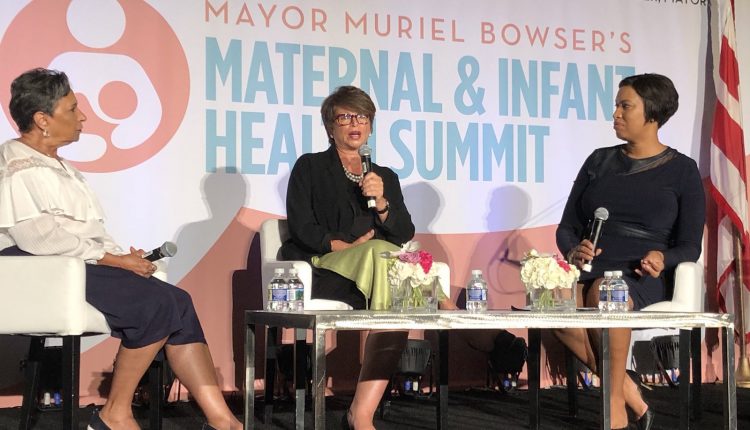
LaDon Love: DC children, families need ‘Birth-to-Three’ services as well as paid leave
I recently attended Mayor Muriel Bowser’s Maternal and Infant Health Summit. It was a great show and messaging event. It was marred, however, by the fact that while Bowser had just signed the Birth-to-Three for All DC Amendment Act of 2018, she included a statement encouraging the DC Council to shift funding for it from the District’s Universal Paid Leave Amendment Act of 2016.
The swag, stage props, lighting and the complimentary lunch were all niceties. But the glitter loses its shine when those in the shadows have no light. At the summit, the mayor failed to outline a plan for implementing Birth-to-Three or even to commit to doing so. Mayor Bowser is missing the point that the District must fund and implement both programs, with the voices of parents leading the way in planning the Birth-to-Three program. The two initiatives should work together to ensure that all babies born in our community thrive and grow into healthy children ready to succeed in school and life.

We know that $1.3 million has been committed to seed the Birth-To-Three program. The expectation is for the District to design a comprehensive system for infants and toddlers that will increase the number of quality affordable childcare slots, provide access to lactation specialists for expectant and new moms, and expand access to mental and physical health services. The expansion of services should bring new job opportunities for health services, along with increased pay for child care providers, as well as pathways to credentials. This program has the potential to raise the bar for programs across the country. Fully funding the program over the next 10 years, however, will require an investment of approximately $500 million.
I’m a mom, aunt and community organizer with Safe Places for the Advancement of Community and Equity In Action (SPACEs In Action). My organizing work focuses on creating expanded opportunities for low-income communities, with intentional outreach in Black communities. Regardless of the hat I’m wearing, I understand firsthand that having access to quality, affordable child care makes it possible for me to work and live my life’s passion. Every parent and child should have the same access to child care and other family supports.
I recently went to the Anacostia Metro station with a few of our members to engage Ward 8 parents and caregivers who will be directly impacted by the Birth-to-Three for All program. I was privileged to hear stories from moms who have to balance finding child care and feeding their families — all on a very limited budget.
One single mom I spoke to works at CVS and pays a large portion of her income for child care. She is living in a shelter because she cannot afford to live on her own. Another mom of a 4-month-old is trying to get child care so that she can work. But she has to find work to be eligible to receive child care. She is stuck.
These stories are just a sample of the challenges faced by District parents. And it is the voices of those who are affected that must inform the implementation of the Birth-to-Three Act. If we allow politicians to use only numbers and addresses to determine who will have access to child care, mental health services, lactation specialists, home visits and other benefits outlined in the act, we are not using our rights as citizens and parents to inform the program planning and add our perspective to the decision-making process. By engaging low-income families — especially low-income African-American and Latinix parents — and caregivers, we will elevate the voices and needs of those directly affected.
We must also engage the child care providers and owners of centers, who are on the front lines serving families and caring for our children. Finally, we need to engage the medical community. It is providing the mental health services and home visits and will have an understanding of which services are being utilized as the program components are implemented. All of these constituencies need to be organized to have a voice.
At the mayor’s summit, there was no talk of creating a safety net for working moms. Families need both paid family leave and Birth-to-Three supports. Paid family leave helps both mothers and babies get off to a healthy start; women who use it are less likely to need follow-up hospitalizations, and instances of infant mortality drop by up to 13 percent. And the Birth-to-Three strategy will see our youngest community members through the critical early years.
Mayor Bowser wrote on her own Maternal and Infant Health Summit webpage that it’s critical that “every infant, mom, and dad has a safe and healthy environment to thrive and receive the support they need to promote early childhood development.”
That’s why residents and advocates worked hard to pass these two complementary measures. We cannot leave our children, parents and community to chance. We need a plan and funding for both Birth-to-Three and paid family leave to ensure that families come first in the District.
LaDon Love is the director of organizing for Safe Places for the Advancement of Community and Equity In Action (SPACEs In Action), which works on creating expanded opportunities for low-income communities, with intentional outreach in Black communities.
About commentaries
The DC Line welcomes commentaries representing various viewpoints on local issues of concern, but the opinions expressed do not represent those of The DC Line. Submissions of up to 850 words may be sent to editor Chris Kain at chriskain@thedcline.org.


Comments are closed.